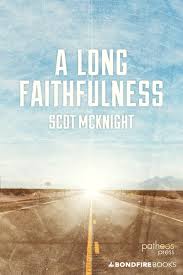 Last week I read a brief e-book that just came out by my friend Scot McKnight, A Long Faithfulness: The Case for Christian Perseverance. His point is a simple one and he gets to it in the very first paragraph: McKnight doesn’t like how “the resurgent Calvinism” talks about God’s sovereignty.
Last week I read a brief e-book that just came out by my friend Scot McKnight, A Long Faithfulness: The Case for Christian Perseverance. His point is a simple one and he gets to it in the very first paragraph: McKnight doesn’t like how “the resurgent Calvinism” talks about God’s sovereignty.
These “pesky Calvinists,” as McKnight calls them, promote “meticulous (or exhaustive) sovereignty,” where all things that come to pass are determined by God (weather, disasters, murders, sexual abuse, etc).
Though applicable to many issues, McKnight focuses his comments on personal salvation, namely whether someone can “choose for God and then later choose against God.” In other words, whether someone truly saved can lose that salvation.
McKnight makes it clear he is not arguing for Arminianism, nor is he critiquing all of Calvinism. He is just going for the “meticulous sovereignty sort,” such as John Piper, D. A. Carson, Mark Driscoll, and David Wells, as well as the institutions that “prop up these voices.”
McKnight says one can lose his/her salvation–it’s called being apostate. Calvinist theology, by contrast, includes “double predestination,” that God determines who will be saved and who will be damned. Though acknowledging that Calvin himself did not teach this, and many Calvinists do not adhere to it, for McKnight the two are necessarily linked if you adhere to “meticulous sovereignty”–for God to choose sovereignly one group means he is also choosing sovereignly the other no matter which way you slice it.
McKnight takes direct aim at this view by turning to the “warning passages” in Hebrews (2:1-4; 3:7-4:13; 5:11-6:12; 10:19-39; 12:1-29).
Here is a quote from the introduction to set up the book’s argument:
My aim is to defeat this view of meticulous soverignty among resurgent Calvinists by showing that the biblical view of sovereignty–a robust version if ever there was one–means God has chosen–because he loves those whom he has created and grants them freedom–to limit his sovereignty by giving humans that freedom. My argument is not philosophical; my argument is biblical. I affirm what the Bible says about God’s sovereignty, and biblical sovereignty entails human freedom both to choose God and un-choose God. If that view of sovereignty can be demonstrated from the Bible, then resurgent Calvinism’s view of sovereignty is unbiblical, pastorally disastrous, and harmful to the church.
After an opening chapter outlining his own journey through Calvinism and relaying the story of Dan Barker–who went from preacher to atheist
from preacher to atheist–McKnight spends most of the book in Hebrews. He interprets each of the warning passages through the lens of four questions: Who is the audience? What is the danger? What are they to do instead of the sin? What will happen if they don’t respond properly?
McKnight’s conclusion: According to Hebrews, “God gave us the freedom to choose, but if we choose to walk away we will be damned.” Hence, meticulous sovereignty in salvation is wrong. In the concluding two chapters, McKnight looks at the profound practical implications of these warnings and briefly how all this relates to another biblical theme, God’s faithfulness to us and the “assurance of salvation.”
For me, I am not so sure what place in the pecking order the “rhetoric of warning” in Hebrews should have in New Testament theology, but that is a huge issue that McKnight only touches on in this brief book. At the very least, interested readers will find McKnight’s exposition of Hebrews thoughtful and compelling, and one that “resurgent Calvinism” will not be able to answer easily.












